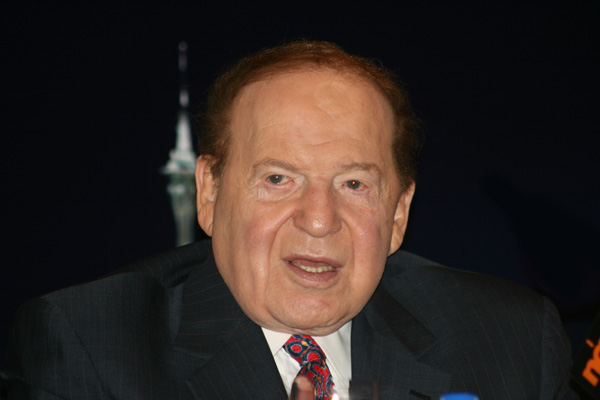Adelson’s acquisition of the Las Vegas Review-Journal has its journalists fighting for their paper’s soul. They may want to take note of Adelon’s dangerous imprint on Israel’s media.

An ethical fight for the ages has been playing out at the Las Vegas Review-Journal in the past week, one that should be taught in journalism schools everywhere. In taking on their new owner, the Review-Journal’s journalists may be well served by some lessons from Sheldon Adelson’s other media playground — Israel.
Since the Las Vegas Journal-Review’s reporters uncovered the acquisition of their paper by casino magnate and Israel Hayom owner Sheldon Adelson, they have been relentless in their pursuit of transparency, in the face of a new boss known for bullying critical journalists into submission.
But their campaign took a hit on Tuesday, when the Review-Journal’s editor, Michael Hengel, announced he had accepted a buyout and would be leaving the paper. “I think my resignation probably comes as a relief to the new owners,” he told his staff.
Hengel was capping off an extraordinary week. Last Wednesday, Review-Journal reporters revealed the identity of the new owner following an investigation that inveighed heavily against the secrecy that had surrounded the sale.
Two days later, they published another stunning investigation that, again, turned the spotlight inward, painting their new boss in an extremely shady light. That piece explored a mysterious assignment they had received a month prior, asking them to drop everything to spend their time scrutinizing three county judges. One of them, it turned out, was overseeing a lawsuit filed against Adelson by the former CEO of his Macau casinos.
(The story gets much more bizarre, with twists including a tiny Connecticut paper with links to Adelson’s company and a possible hit job on the same judge by a journalist who it seems does not exist. This is truly the stuff of great cinema.)
The Review-Journal didn’t stop there. A passionate editorial promised to keep fighting for readers’ trust. Reporters amassed a document listing possible conflicts of interest between Adelson and their coverage, and worked on a disclaimer for when such conflicts arise. A column by John L. Smith, one of many journalists to enjoy the distinct honor of being sued by Adelson, openly declared his new boss to be “precisely the wrong person to own this or any newspaper.”
The search for a new editor is underway. One can’t help but hope the paper’s reporters find a way to turn the same scrutiny against Hengel’s replacement. If Adelson’s role in Israel’s media is any indication, however, they will face an uphill battle, up against a formidable challenger known to use his vast wealth to steamroll the rules of journalism and those who champion them.
As most Israelis know, Israel Hayom, a free daily paper, was created by the Republican mega-donor to provide a platform for his chum Benjamin Netanyahu while circumventing Israel’s extremely strict campaign finance laws. He bankrolls the paper at a considerable loss, selling ad space significantly below market value to disadvantage his competitors. The paper, now the country’s most widely read, has dramatically upended Israel’s media landscape.
At the helm are Netanyahu insiders. The editor is Amos Regev, handpicked for the job by his friend the prime minister (then the opposition leader). Regev reportedly reviews almost every word before it goes to print, excises all copy remotely critical of the prime minister, and must personally approve all photos of Sarah, Netanyahu’s wife. A number of other members of Netanyahu’s inner circle have been on the Israel Hayom payroll, including Natan Eshel, Netanyahu’s disgraced former chief of staff, and Dror Eydar, who has worked as a speechwriter in the Prime Minister’s Office. While the paper’s line is blatantly rightwing, it is not necessarily ideologically consistent – it goes after Netanyahu’s rivals to the right in addition to the left. It’s not about promoting ideas, but one man. Who also happens to be the most powerful person in Israel.
There are obvious differences between the two papers. The Review-Journal is a respected institution, not a thinly veiled propaganda platform. The Las Vegas paper’s editorial page has always supported Republican candidates, so Adelson should be covered there. (It is less aligned on drug and healthcare policy, and, more notably, internet gaming and matters of the local Vegas economy. As the paper noted this week, that could very well change.)
The full extent of Adelson’s direct meddling in Israel Hayom isn’t clear, though it may become so soon – earlier this month, a court ruled in favor of Channel 10 journalist Raviv Drucker’s petition for the release of records logging Netanyahu’s conversations with Adelson and Regev. Drucker has heard from sources that Regev disappears into his office every night at 11:45 p.m., just before the paper goes to print. Occasionally, when he comes out, last-minute changes are made to the next day’s paper.
The Review-Journal’s publisher says he has been assured that the mogul will not interfere in the paper’s content. But the Israel Hayom experience shows that he may not need to dictate content to change the paper’s course. Hiring decisions may do the job for him.
In the face of this reality, the Review-Journal journalists’ desperate fight for the soul of its paper is all the more honorable. From a recent editorial:
We’ll disclose their ownership of the Review-Journal when covering the gaming industry, when government actions affect their properties, when Las Vegas Sands and its subsidiaries have business in the courts, and even when we’re reviewing or previewing shows, restaurants and events at their properties. We’ll disclose candidates and office holders who’ve received political contributions from the Adelsons. And if a story might cast a Las Vegas Sands competitor in poor light, we’ll disclose our ownership in that case, as well. We’ll disclose, disclose, disclose. That way, you can be the judge of whether we’re being fair or whether we’ve become a micromanaged public relations tool.
Israel’s media could learn a thing or two from them.

